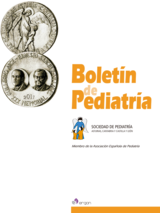El niño mal comedor y la importancia de un buen comienzo
M.Á. San José González , P. Méndez Fernández
Bol. Pediatr. 2018; 58 (244): 107 - 116
Durante los primeros años de vida, con frecuencia los padres o cuidadores están preocupados por si la cantidad y/o variedad de alimentos que ingieren sus hijos no es correcta y pudiera ocasionarles problemas de salud, de nutrición o de crecimiento. Se han propuesto diferentes términos como niño mal comedor, picky eater, aversión/rechazo alimentario infantil o neofobia alimentaria. Conocer los factores y los mecanismos implicados en el aprendizaje de la conducta alimentaria puede ayudarnos a comprender y manejar este problema. La diversificación alimentaria cumple un importante papel en el aprendizaje alimentario del niño. Establecer unas buenas pautas en estos primeros años puede ser la intervención más eficaz tanto para disminuir el número de niños con problemas de alimentación (rechazo, selectividad alimentaria) como para prevenir la actual epidemia de sobrepeso-obesidad en el mundo desarrollado. La llamada alimentación complementaria dirigida por el bebé (baby led weaning) puede favorecer el aprendizaje, pero también tiene riesgos y aún no cuenta con evidencias firmes. No obstante, adoptar algunos aspectos de este método en la rutina de la diversificación alimentaria tradicional (permitir la autorregulación del bebé, incorporar al niño a las comidas familiares y ofrecer alimentos con texturas que pueda manipular el lactante en cuanto este alcanza un desarrollo adecuado) puede ser beneficioso.
The picky eater and the importance of a good beginning
During the first years of life parents or caregivers often are concerned about the amount and / or variety of food their children eat it´s inaccurate and it could cause health, nutrition or growth problems. Different terms have been proposed as picky/fussy eater, infant´s food aversion/ rejection, or food neophobia. To know the factors and the mechanisms involved in learning eating behaviour can help us to understand and manage this problem. Complementary feeding plays an important role in child’s learning eating behaviour. Establishing a good pattern in these early years can be the most effective intervention so much to reduce the number of children with feeding problems (rejection, food selectivity) as to prevent the current epidemic of overweight-obesity in the developed world. Baby led weaning can promote the learning, but it also has risks and still there is limited evidence about it. However adopting some aspects of this method in the routine of traditional food diversification (to allow self-regulation of the baby, incorporating the child to family meals and provide food with textures that infant can handle as soon as it reaches a suitable development) may be beneficial.
Artículo completo (PDF) (265 kb.)
- Endocrino-Metabolismo
